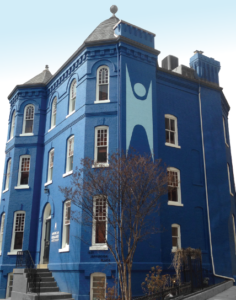Commentary from Nadya Dutchin, AHA Executive Director

I could not be more pleased to greet you as the new Executive Director of the American Humanist Association (AHA). My family is from Guyana and I am a first-generation American who was raised in Minneapolis, MN, attended college at Florida A&M University, and moved to Baltimore, MD in 2008. Since moving to Maryland, I’ve worked for the Be The Match Registry, the national bone marrow registry; Groundswell, Inc., a community solar developer; and Power Shift Network, an organization that develops leadership skills in youth climate justice organizers.
This past summer, the AHA’s job description caught my eye because the organization was looking for a visionary humanist leader with strong knowledge of social justice issues, experience working with young people, and a commitment to diversifying movements. I was immediately inspired to apply because I have spent years developing the skills and strategic knowledge to take the baton from our former ED, Roy Speckhardt, and carry it into the future as Roy intended when he left. I’m honored to be stepping into the very large shoes of a leader who had the humility and vision to make space for a Black woman, like me, to lead this organization.
My approach to life, personal integrity, morality, and service has always been aligned with the humanist movement. I even began raising my daughter as a humanist by telling her as a preschooler, “We don’t need a God to be a good person”—a pretty close interpretation of our motto “Good without a God”. I am a humanist because I have the agency to decide what impact I’d like to make in this world during this one life that I’ve been given and I can do “the right thing” because it’s the right thing to do. Living without the expectation of pleasing (or the fear of disappointing) an all-powerful being, frees me to critically consider, define, and re-examine my own moral code after every success and failure I experience.
The potential to expand the AHA and the humanist movement in this moment is nearly limitless as we see a burgeoning population of young, diverse people from across all demographics moving away from organized religion and becoming more politically active, manifesting a more just, inclusive, and equitable future. More and more, I see people who are eager to connect with a community of values-aligned people as they leave houses of worship behind. I deeply believe that the AHA can be the community they call home. Together, we can build the right infrastructure so that the AHA staff, members, chapters, and partners are ready to welcome people who desire humanist connection and camaraderie.
At the AHA, the energy and excitement about executing our strategic plan is palpable. We are charged with deepening the connection of humanism to social justice issues. It’s important to note that, because of the experience I bring to the table, executing on this isn’t about jumping on the trendy bandwagon. The world is evolving and we rational, free-thinking people have to be willing to evolve with the changing needs of our society.
Every single issue within the social justice framework is a humanist issue. Reproductive justice, disability justice, language justice, racial justice, economic justice, access to healthcare, housing and food insecurity, voting rights, climate, and environmental justice (just to name a few!) are all humanist issues. We humanists care about the condition of people in our society, their ability to thrive, and their overall well-being. Social justice issues are inherently humanist issues.
We humanists work to make the world a better place and help people cast off the shackles from their minds and we should speak more loudly about the good works we’ve done over decades. However, now is not the time to become complacent and rest on our laurels when we live in a time with the greatest wealth and resource gap in our history. We are a movement of people who are fiercely intelligent, kind, and well-connected, with the moral imperative to stand in the gap for those who need a bridge.
The time is now for all humanists to reinvigorate ourselves as lifelong learners, activists, and community leaders and take up the mantle of social justice issues to leave a rich and vibrant legacy for the next generation of humanists, like my seven-year-old daughter. The AHA is working diligently to create a place where our members can embrace learning new skills and ask questions about subjects or concepts that may seem confusing or complicated. I invite everyone to join the AHA in being brave and bold as we work together to reimagine a free and compassionate society that we all richly deserve.
